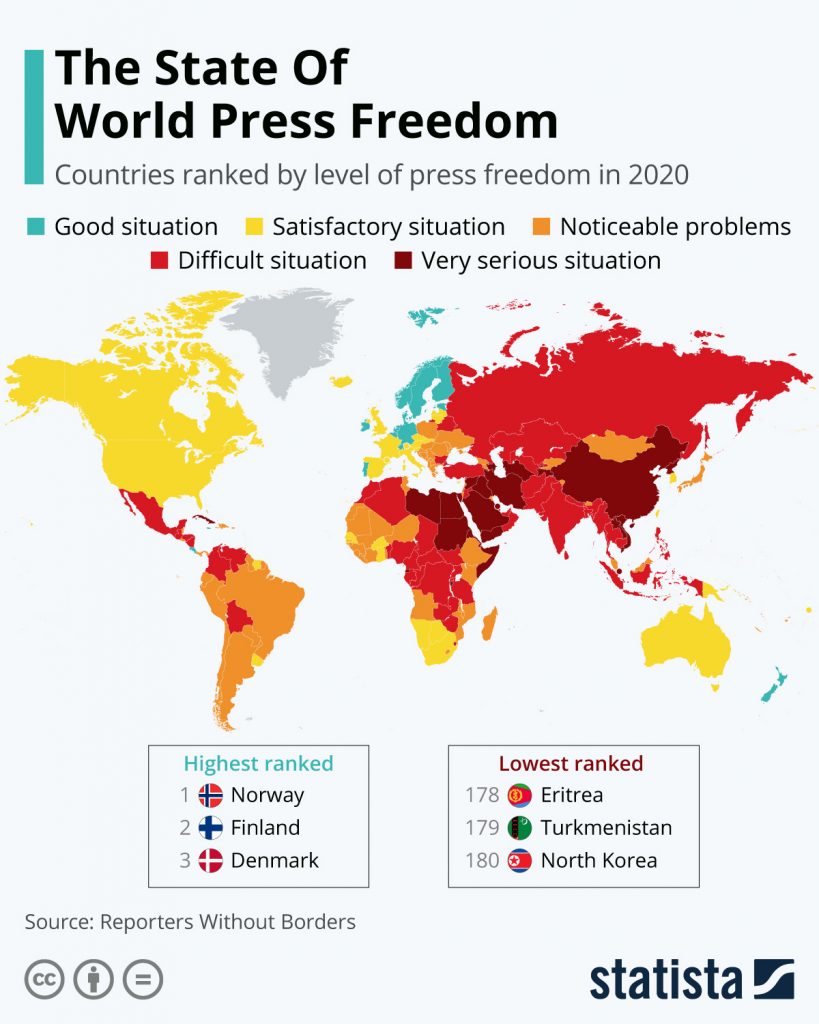These are the freest countries for journalists, according to the 2020 World Press Freedom Index.
Norway emerges as the country with the highest level of press freedom in the 2020 World Press Freedom Index, an annual report by Reporters Without Borders (also known as Reporters sans frontières or RSF).
This is the fourth time in a row that Norway obtained this particular distinction. Finland secures the runner-up position just like in last year’s rankings. Denmark climbed up by two places, now in the third spot.
Meanwhile, both Sweden and the Netherlands went down by one rank from last year, now in fourth and fifth place, respectively. According to RSF, this is due to the recorded increases in cyberharassment cases for both countries.
From our partners:
In the opposite extreme, North Korea turns out to be the worst country for journalists this year at 180th place, taking the position from Turkmenistan, now in 179th place.
Other poor performers in the Index include Eritrea (178th), China (177th), Djibouti (176th), Vietnam (175th), and Syria (174th).
The top five is a clean sweep for Europe this year. The continent also retains its position as the most favourable continent for press freedom in the world.
Middle East and North Africa (MENA), on the other hand, remains to be the worst region for media practitioners.
Worldwide, only 26.07% of the 180 countries included in this year’s ranking have ‘satisfactory’ to ‘good’ press freedom conditions.
Meanwhile, An overwhelming 73.93% of the countries have been classified as having either ‘problematic’, ‘difficult’, or ‘very serious’ cases of media abuses.
The great magnifier
The COVID-19 pandemic has served as a magnifier of various global problems which have been mostly overlooked in the past. In the realm of journalism, this also proves to be true.
Authoritarian regimes across the world have taken advantage of the nationwide lockdowns to impose measures that would have been impossible in normal circumstances. Now that people are staying in their homes and overall mobility is limited, mass protests are not permissible and the manipulation of the press is much easier.
“We are entering a decisive decade for journalism linked to crises that affect its future,” according to RSF Secretary-General Christophe Deloire.
RSF pinpointed five crises that are compounded by the emergence of COVID-19:
- a geopolitical crisis with the emergence of authoritarian regimes
- a technological crisis driven by the lack of democratic guarantees
- a democratic crisis with the rise of repressive policies
- a crisis of trust, with the declining reputation of media
- an economic crisis which drags down the quality of journalism
Addressing these crises, according to RSF, will be the deciding factor of the fate of world press freedom for the decade.
Methodology
The World Press Freedom Index is a metric in a 0 to 100 scale, with 100 being the worst possible score.
In order to gain the Index score, media professionals, sociologists, and lawyers across the world were asked to complete a questionnaire with 87 items belonging to seven indicators:
- Pluralism
- Media Independence
- Environment and self-censorship
- Legislative framework
- Transparency
- Infrastructure
- Abuses
For the overall Index, two scores are computed. The first one is ScoA which is the weighted score from the first six indicators. The second one is ScoB which included the seventh indicator (Abuses). The higher of the two scores is the overall Index rating for a country.
This approach is taken by RSF in order to take into account countries where abuses are scarce but news and information are heavily censored.
To know more about the insights from this year’s Index, you can check RSF’s full report.














